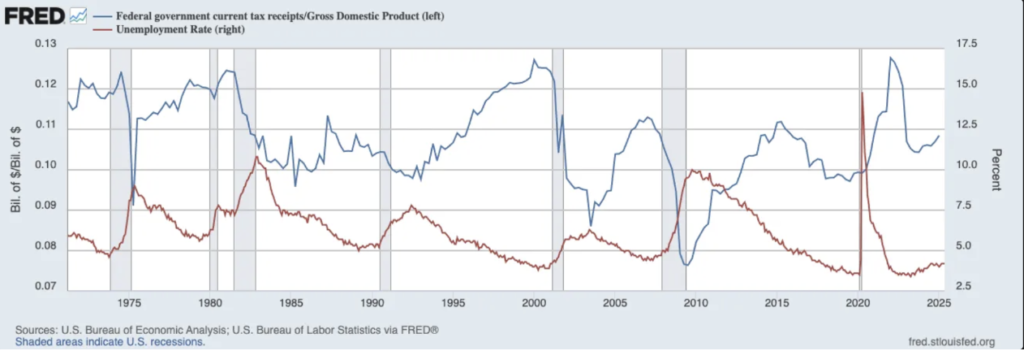US unemployment figures came in better than expected last week at 8.5%. While noting that the figures under-represent actual unemployment, does this improvement mark the beginning of an American economic recovery? If so, it is the last thing the consensus expects.
Let us assume for a moment that Europe’s banks are rescued from the crisis. This being the case, there is every possibility a US recovery will take place for two basic reasons: businesses are always keen to invest as soon as market conditions stop deteriorating, and secondly GDP should begin to reflect increased quantities of money flowing into the economy. I shall comment on each in turn.
Businesses in the US have been accumulating cash in these uncertain times, and it is generally assumed, incorrectly, that managers are happy to just sit on this accumulating cash. It is not in the nature of business to sit idly waiting for the tide to turn: businessmen are entrepreneurs who continually seek profitable opportunities, recognising that wasting time is itself an expense.
This is why the capitalist system survives despite and not because of the attempts of central bankers and governments to assist the entrepreneurial function. And once capital investment begins to recover, competition ensures it spreads. The conditions now exist for this recovery to take place, if only because the bad news is elsewhere and interest rates are extremely low. We can therefore assume (Europe and other systemic disasters permitting) that a business recovery should take place. How far this goes before rising commodity and energy prices derail it is another matter.
Meanwhile the expansion of raw money since 2008 has been remarkable, but so far the bulk of this money has either gone back on deposit at the Fed, is being deployed for speculation in capital markets, or is funding the government. Very little of this money has actually added to the GDP statistic by being deployed in the economy, which will change when businesses go further than just reinvesting cash balances, and actually borrow to build capacity.
Putting this together, in the earliest stages of economic recovery companies reinvest their own money. The benefit to the GDP statistic is marginal to begin with, but as economic recovery gains momentum and businesses begin to borrow, money will flow into the economy from capital markets, inflating the GDP money-value. So by the time it is confirmed at the GDP level, the recovery will actually be well under way.
The political consequences in an election year of such a development are beyond the scope of this article. Rising interest rates will begin to be discounted, giving support to the dollar; but before that happens a bear squeeze should develop in energy and commodity futures, partly because markets are wrong-footed for economic recovery, partly because market liquidity has been reduced as a result of the MF Global scandal, and partly because the outlook for price inflation will change radically.
Precious metals should fare well. Industry will want to build silver stocks to lock in low prices, conflicting with physical demand from investors, and gold should get a significant boost from the change in the inflationary outlook.
This article was previously published at GoldMoney.com.



Also, weren’t a lot of the new US jobs in their weapons-industry which is state-spending?
Defence spending in the United States will be just over 4% of GDP this year – and most of will be on personal costs, not weapons programs.
This compares some 10% of GDP under Jack Kennedy (before Vietnam) – and government, as a whole, was much smaller as a percentage of the economy back then.
As for the American economy.
The money supply and banking side is a total mess – disguised (as in Europe) by dishonest accounting procedures. The only question is “when” (not “if”) it will collapse.
As for the fiscal side – the national debt (even excluding all Enron style unfunded mandates) is over 15 TRILLION Dollars (include the unfunded mandates and the number is vastly bigger).
The government backed student loan debt (not included in the above) is another trillion Dollars (trillion “with a T” as they say). This money can not be repaid even by those students who are in work (the 8.5 unemployment figure is, of course, FAKE) – as MacDonalds (and so on) does not pay high enough wages to repay student loans that run (per ex student)at tens (even hundreds) of thousands of Dollars.
Social Security, Medicare, Medicaid, SCHIP, and (comming to a street near you soon) Obamacare – utterly unsupportable (financial black holes – all of them).
The financial position of many States (California, New York, Illinois and virtually all the cities is utterly terrible – totally unsustainable.
And the housing market (Freddie Mac and Fannie Mae)…. – well I have run out of words to describe how bad the liablities are there.
And the rest of the economy is saturated by REGULATIONS which make PRODUCTIVE investment (for example in oil refinaries) almost impossible.
There is only one real question.
Will the phony “recovery” break down before or after the November elections?
If it does not collapse before the elections, then the ecomomy will certainly collapse in 2013 – just in time for Comrade Barack to introduce “Emergency” rule? “Paranoid” – actually the plans are already being drawn up.
By the way to talk of “capitalism” (if one means a free market) in the context of the United States is not sensible – this is a state dominated economy (for example a bigger share of housing is government owned than it was in Poland under Soviet rule).
“But strong American companies”.
American companies come in two sorts.
Government pets such as General Electric (who get special tax treatment and endless government contracts and subsdies).
And nongovernment pets – who face the highest company taxation (Federal and State combined) in the Western world, and perhaps the worst system of regulation in the Western world also (again the “pets” are special case).